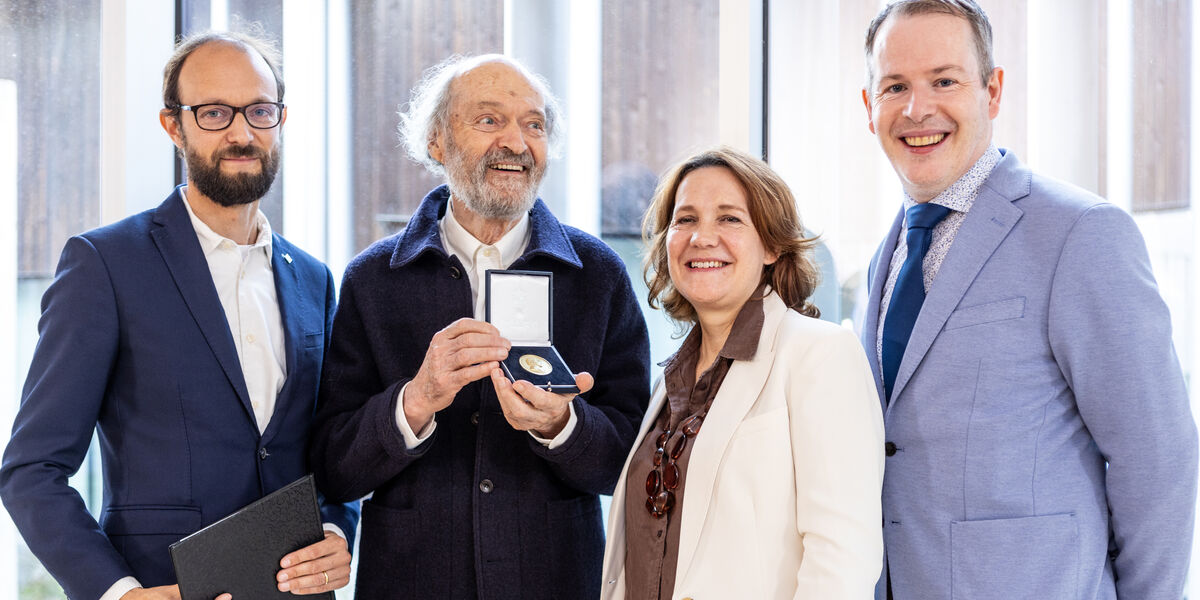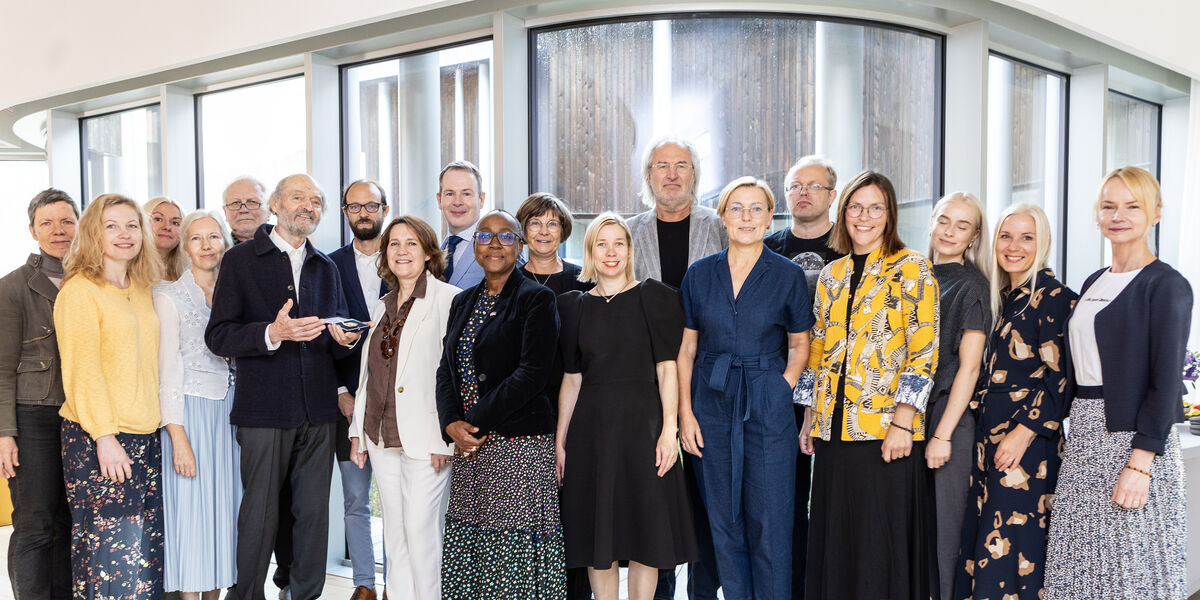

Arvo Pärt receives the RPS Gold Medal
13 Sep 2024
The internationally-renowned composer Arvo Pärt has - in the same week as his 89th birthday - been awarded one of the highest international honours in music: the Royal Philharmonic Society Gold Medal.
The medal was presented on Thursday 12 September at the Arvo Pärt Centre by RPS Chair Angela Dixon who travelled with RPS Chief Executive James Murphy to the composer’s homeland Estonia for the occasion. Attending the occasion with the composer was his son Michael.
The RPS Gold Medal was first presented in 1871. It is awarded for the most outstanding musicianship to the finest musicians of any nationality. It bears the image of Beethoven, to celebrate the close relationship between the composer and the Society which commissioned his Ninth Symphony.
Recipients are chosen by the Board and Council of the RPS, their choice annually approved by RPS Members. Among prior recipients are Brahms, Elgar, Vaughan Williams, Holst, Rachmaninov, Sibelius, Prokofiev, Stravinsky, Britten, Bernstein, Messiaen, Boulez, Ligeti, Myra Hess, Kathleen Ferrier, and more recently Jessye Norman, Martha Argerich, Daniel Barenboim, Janet Baker, Simon Rattle and Mitsuko Uchida. The presentation to Arvo Pärt comes soon after the presentation of the medal to Thomas Adès by former recipient Simon Rattle onstage last week at the BBC Proms. Further information about that occasion is linked here.

On presenting the medal to Arvo Pärt, Angela Dixon said:
'Arvo, your music has touched the world. We salute you for your political courage which has demonstrated to today’s young composers what power their own voices can have. We treasure the spiritual purity of your music, drawn from your own faith and the sacred music of times past, speaking to listeners from so many walks of life, resonating across borders.
What gifts you have given us all: from the extraordinary offerings of the late 1970s – from Für Alina, Fratres, Tabula rasa, Spiegel im Spiegel, and the Cantus in Memoriam Benjamin Britten – to the recent Greater Antiphons and Adam’s Lament. Your meticulously-crafted creations communicate such clarity and beauty, drawing us to contemplate the very essence of music itself. You inspire us to savour every note, and you calm the hectic heartbeat of the world.'
Michael Pärt expressed how his father’s music draws on English traditions:
'I would like to express our deepest gratitude for this prestigious recognition. Music is not just about sound, but a deep connection between the past and the present, between cultures and traditions, and between individual experiences. In my father’s work, this connection is embodied in the way he draws from early music traditions while creating something contemporary. And among the many traditions that have shaped his music, English choir music holds a very special place.
As a composer, my father’s journey towards his unique musical language - the tintinnabuli style - was not immediate. It was a journey of creative and spiritual exploration. His close connection with the sacred text, which is at the heart of his music, has been shaped by a profound reverence for choral and vocal traditions - traditions deeply rooted in the English early music. This bond becomes even more evident when we look at his collaborations with the renowned vocal ensemble, The Hilliard Ensemble, and their founder, Paul Hillier. Through their interpretations of Arvo's music, a new dialogue was forged between old and new, past and present.
Paul Hillier has described how my father’s tintinnabuli style echoes the ringing of English church bells, with its subtle, evolving changes that create a sense of timelessness. This comparison highlights how my father’s music, though distinctly his own, resonates with the simplicity and spiritual depth found in early English music, returning to the fundamentals, to the beauty of a single note, a single word, or a single phrase.'
You can read Michael’s full speech at the occasion, linked here.
Also attending were staff of the Arvo Pärt Centre, Ify Agboola (Deputy Head of Mission, British Embassy, Tallinn) and Tõnu Kaljuste (Artistic Director and Chief Conductor, Estonian Philharmonic Chamber Choir).

Arvo Pärt was born in 1935 in Paide, Estonia. After studies in Heino Eller’s composition class at the Tallinn State Conservatory, he worked as a sound engineer for Estonian Radio. Since the late 1960s, Pärt has been a composer. Both the avant-garde spirit of Pärt’s early works as well as the religious aspect of the music he composed in 1970s led to controversial reviews and confrontations with Soviet officials. In 1980, Arvo Pärt and his family were forced to emigrate – first to Vienna and then to Berlin, where they stayed for almost 30 years. In 2010, Pärt returned to Estonia where he resides today.
His dramatic collage piece Credo (1968) turned out to be a turning point in his oeuvre as well as his life – Pärt withdrew and renounced the techniques and means of expression used so far. Pärt’s quest for his own musical voice drove him into a creative crisis that dragged on for eight years. During these years he joined the Orthodox Church and studied Gregorian chant, the Notre Dame School and classic vocal polyphony.
In 1976, Pärt emerged with a new and highly original musical language which he called tintinnabuli (from the Latin for ’little bell’). The first tintinnabula piece Für Alina for piano (1976) was followed by works like Cantus in Memoriam Benjamin Britten (1977), Fratres (1977), Tabula rasa (1977), Spiegel im Spiegel (1978) and many others. The year 1984 marks the beginning of his creative collaboration with the distinguished CD label ECM Records and the producer Manfred Eicher, and the first recording of Tabula rasa. Since, his music has been performed and recorded by the best orchestras and interpreters of our time.
Pärt’s oeuvre is rich and versatile, including many large-scale compositions for choir and orchestra, four symphonies and works for soloists and orchestra, as well as numerous choral pieces and chamber music. The majority of his works are based on liturgical texts and prayers like Passio (1982), Te Deum (1985), Miserere (1989/92), Kanon pokajanen (1997), and Adam’s Lament (2010).
Established in 2010, the Arvo Pärt Centre combines the composer’s personal archive with an information and music centre. It is an open meeting place for musicians, researchers and music lovers – for anyone interested in Arvo Pärt’s music and world of ideas.
